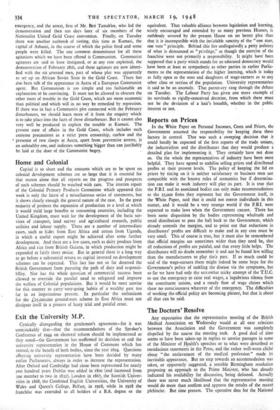Exit the University M.P.
Cynically disregarding the gentlemen's agreement—for it was unmistakably that—that the recommendations of the Speaker's Conference of 1944 on electoral reform should be implemented as they stood—the Government has reaffirmed its decision to end the university representation in the House of Commons which has existed, to the benefit of both bodies, since the year 1604. Questions affecting university representation have been decided by many earlier Parliaments, always in order to increase the representation. After Oxford and Cambridge had alone been represented for nearly two hundred years Dublin was added in Illoo (and increased from one member to two in 1832), London in 1867, the Scottish Univer- sities in 1868, the Combined English Universities, the University of Wales and Queen's College, Belfast, in 1918, while in 1928 the franchise was extended to all holders of a BA. degree or the equivalent. That valuable alliance between legislation and learning, wisely encouraged and extended by so many previous Houses, is ruthlessly severed by the present House on no better plea than that it is incompatible with the inviolable sanctity of the "one man, one vote " principle. Behind this lies undisguisedly a petty jealousy of what is denounced as " privilege," as though the exercise of the franchise were not primarily a responsibility. It might have been supposed that a party which stands for an educated democracy would have been at least as sympathetic as other parties in earlier Parlia- ments to the representation of the higher learning, which is today as fully open to the sons and daughters of wage-earners as to any other class or section of the population. University representation is said to be an anomaly. That parrot-cry rang through the debate on Tuesday. The Labour Party has given one more example of its servitude .to rigidly-conceived doctrine, from which there must not be the deviation of a hair's breadth, whether in the public interest or not.






























 Previous page
Previous page